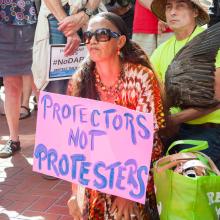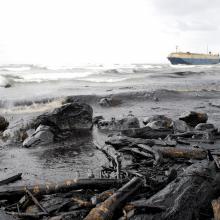Oil Spill
A Filipino priest is touring top European banks to demand they curtail ties with companies behind new fossil fuel projects in a region of his home country that is rich in fish and coral. But he is leaving his meetings with bankers feeling frustrated.
The Keystone Pipeline leaked about 5,000 barrels of oil in South Dakota on Thursday, according to TransCanada. The company said crews were able to shut down the pipeline early Thursday morning and began investigating the leak.

Image via Diego G Diaz/Shutterstock.com
President Obama’s words contradict those of Vicki Granado, the spokesperson for Energy Transfer Partners, the company building the Dakota Access Pipeline.
“We are not aware that any consideration is being given to a reroute,” she said, following the publication of President Obama’s interview, “and we remain confident we will receive our easement in a timely fashion.”
Model breastfeeding, Fox News vs Jesus, 'Street Sense,' Bin Laden's bookshelf, and more!
Andrew Bird is one of my favorite musicians. I love the way he makes a one-man band, looping over his own violin playing, singing, whistling, and stomping to create beautiful songs. No two live performances are the same. And once, when I saw him in D.C., he played a new song that was still being written — one that had come from his heart, but he hadn’t yet finished and didn’t think it had an end.
He told us he wrote the song during the BP oil spill, often called “Deepwater Horizon,” that happened in the Gulf of Mexico. During that disaster, over 200 million gallons of crude oil spewed into the Gulf for days on end from a hole nobody could plug, and the whole country watched it happening live.
Editor's Note: New Vision Renewable Energy connects Christians with opportunities to provide renewable solar lights to people in the developing world. Their Christmas Lights Advent Devotional features daily readings and questions from prominent Christian thinkers, including Sojourners president Jim Wallis. This Day 10 of Advent devotional from Jim Wallis is reprinted and adapted with permission of New Vision Renewable Energy. You can find the full Christmas Lights Advent Devotional guide and solar light kits here: http://nvre.org/devotional-order.html
Proclaiming Jesus as light of the world is an audacious statement. It directly challenges all those idols that persistently attempt to replace God as the center of our lives and our world. In our culture, a selfishness that denies any obligation to anyone or anything beyond our own self-interest may be the greatest idol of all. It denies that demanding more and more energy at great cost to our environment and the people who live close to the land has problematic consequences. We have lost sight of the common good and the consequences have been devastating.
In many places, hope has turned into despair. Darkness seems to be crowding out light. From where will our help come from?
Occurrences of oil spills in several states have garnered little media attention in the last few years. In some cases, prompt reports are recorded, yet in others, days have gone by before the authorities are alerted and the spill becomes public knowledge.
The most recent episode happened Oct. 15, in Port of Long Beach, Calif. Upon discovery of an oil leak, Exxon Mobil announced that it was temporarily suspending operations of its pipeline system. The pipeline, which connects to the company’s refinery in Torrance, carries up to 155,000 barrels of oil per day. Exxon filed documents with the California Emergency Management Agency that claimed the leak did not affect waterways, although the company was ordered to pay a $236 million fine for contaminating groundwater in New Hampshire this past April.
Another spill was initially discovered on Sept. 29 by North Dakota farmer Steve Jensen, the Associated Press reported. While harvesting wheat, Jensen discovered the leak in his field “spewing and bubbling 6 inches high.” The rupture was a break in Tesoro Corporation’s underground pipeline. While it remains unconfirmed, early evidence cites that corrosion on the 20-year-old pipeline is the cause of rupture. At least 20,600 barrels of oil flooded the 7-acre spill zone, equal to about 7 football fields.
The delay in making public North Dakota’s oil spill proves as worrisome as the spill itself. It took 11 days after the spill’s discovery for it to become public knowledge. Officials claim they were not aware how extensive the spill was, but critics point to the state’s financial benefits in the recent gas and oil boom as reason for the authorities’ hesitancy in coming down on oil companies. But economic incentives shouldn’t diminish the serious need to weigh environmental risks and costs.
The cases begin to pile up.
In an attempt to rebuild the image of the five gulf states — Alabama, Florida, Louisiana, Mississippi, and Texas, federal and state officials have joined forces on their journey to replenish the damage from 2010's BP oil-well tragedy. Talks of baseball stadiums, sea walls, and donations to the Gulf Coast Ecosystem Restoration Council are among the many entities who will benefit from President Obama’s Restore Act signed last year. The New York Times reports:
The money will mostly be split among the states and a new entity, the Gulf Coast Ecosystem Restoration Council, composed of state and federal officials. There are already plenty of ideas among the states for spending the cash, including constructing a sea wall around the city jail in Mobile, Ala., and deepening shipping channels. Biloxi, Miss., is using money already given to the state by BP to build a baseball stadium.
Here’s another idea: the states and the council should require that a nickel of every dollar they control be used to buy and protect coastal marshes and wetlands. It is the most important thing they can do to help the gulf survive the next oil spill.
Read more here.
When the ExxonMobil Pegasus pipeline split open in late March it spilled 210,000 gallons of oil into a small Arkansas town. The spill galvanized opponents of the Keystone XL Pipeline, who cited its planned path through major rivers and aquifers. Activists say TransCanada, which would build and operate the pipeline, underestimate the size of potential spills.
"I don't agree with people who say a spill into the aquifer will ruin the whole aquifer. It would ruin a very small piece, but it's important if that's your small piece," John Stansbury, a University of Nebraska professor of environmental and water resources engineering. "But if it got into a major river, it could create a plume hundreds of miles long."
Read more here.
In the midst of our celebration of Earth Day, government agencies continued the debate over the Keystone XL Pipeline, which would transport oil from Canada’s tar sands across the United States into the gulf coast of Texas to be refined and shipped elsewhere. The State Department, tasked with reviewing the pipeline’s environmental impact, gave it a tentative pass a month and a half ago.
Activists across the country sprang into action to oppose the pipeline, citing its contribution to climate change and risk of oil spills. Supporters of the pipeline shot back, denying the climate impact of the pipeline and claiming that the oil would be produced whether or not the Keystone project moved forward.
The Environmental Protection Agency responded yesterday, calling into question the State Department’s findings and echoing the concerns of environmental activists everywhere: the Keystone Pipeline would be greatly exacerbate climate change.
Residents of Mayflower, Ark., spent Easter weekend evacuated from their homes as Exxon Mobil attended to a major oil spill from a crude oil pipeline. Residents described scenes of oil running down the streets like a river, as 22 families were forced to leave their homes.
Since the pipe burst on Friday afternoon, cleanup crews have collected around 12,000 barrels of oil and water. Images from the weekend show quiet cul-de-sacs inundated with thick, black sludge, and parents reported concern for their children and whether they would be able to play outside.
One year after the Deepwater Horizon Oil Spill, life has not returned to normal in the Gulf.






